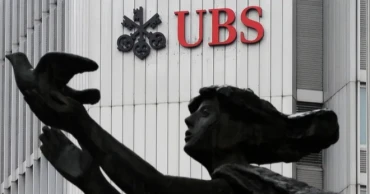Credit Suisse
UBS reaps $28B in new assets in 1Q; Credit Suisse deal looms
Swiss banking giant UBS said Tuesday it took in $28 billion of net new money for its wealth management business in the first quarter, with $7 billion of that coming in the days after the announcement of its government-backed takeover of ailing rival Credit Suisse.
The Zurich-based bank, which is set to become Switzerland's banking titan after the merger closes in coming months, said underlying pre-tax profit dropped 22 percent to $2.35 billion in the quarter compared to a year ago, while underlying revenues fell 8 percent.
UBS said it had bought back $1.3 billion worth of its shares during the quarter, and reiterated that the share-buyback program has been temporarily suspended ahead of the closing of the 3 billion Swiss franc ($3.4 billion) takeover of Credit Suisse announced on March 19.
Also Read: Credit Suisse, UBS shares plunge after takeover announcement
“In the first quarter, we maintained positive momentum across the firm and attracted $28 billion of net new money in GWM (Global Wealth Management), of which $7 billion came in the last 10 days of March, after the announcement of our acquisition of Credit Suisse,” UBS said in a statement.
The bank said it “captured demand” for higher yield into money market and U.S.-government securities at a time of rising interest rates that can increase the return on lower-risk assets like U.S. government bonds.
“We delivered these results during a quarter characterized by persistent concerns about interest rates and economic growth exacerbated by questions about the stability of the banking system, especially in the U.S.,” UBS said. “Against this backdrop, private and institutional investors’ activity remained muted.”
Also Read: UBS to buy Credit Suisse for nearly $3.25B to calm turmoil
The net inflows at UBS came in marked contrast to the 61 billion Swiss francs (nearly $69 billion) in outflows that Credit Suisse reported Monday for the first three months of the year, adding that clients are still withdrawing assets.
The forced marriage of Switzerland's two biggest banks — arranged by the Swiss executive branch, central bank and financial markets regulator — was designed in part to help stabilize the global financial system that had been roiled by the collapse of two U.S. banks.
The reputation of 167-year-old Credit Suisse had been pummeled in recent years over stock price declines, a string of scandals and the flight of customers worried about the bank’s future.
2 years ago
Global stocks sink after Credit Suisse takeover
Global stock markets sank Monday after Swiss authorities arranged the takeover of troubled Credit Suisse amid fears of a global banking crisis ahead of a Federal Reserve meeting to decide on more possible interest rate hikes.
Hong Kong's main index slid 2.7%. London, Frankfurt and Paris opened down more than 1%. Shanghai, Tokyo and Sydney also declined. Wall Street futures were off 1%. Oil prices plunged more than $2 per barrel.
Swiss authorities on Sunday announced UBS would acquire its smaller rival as regulators try to ease fears about banks following the collapse of two U.S. lenders. Central banks announced coordinated efforts to stabilize lenders, including a facility to borrow U.S. dollars if necessary.
Switzerland’s share benchmark was down 1.8%, while Credit Suisse’s shares plunged 63% and rival UBS, which is acquiring it, sank 14%.
Also Read: UBS to buy Credit Suisse for nearly $3.25B to calm turmoil
Investors worry banks are cracking under the strain of unexpectedly fast, large rate hikes over the past year to cool economic activity and inflation. Prices of bonds and other assets on their books fell, fueling unease about the industry’s financial health.
“Investors are waiting to see where the dust settles on the banking saga before making any bold moves,” said Stephen Innes of SPI Asset Management in a report.
In early trading, the FTSE 100 in London lost 1.6% to 7,220.62. Frankfurt's DAX fell 1.4% to 14,555.79 and the CAC 40 in Paris lost 1.2% to 6,842.36.
On Wall Street, the future for the benchmark S&P 500 index was off 1%. That for the Dow Jones Industrial Average was down 1.2%.
On Friday, the S&P 500 lost 1.1%. The Dow fell 1.2% and the Nasdaq composite lost 0.7%.
In Asia, the Hang Seng in Hong Kong lost 2.7% to 18,879.20 after being down 3.3% at one point. The Nikkei 225 in Tokyo shed 1.4% to 26,945.67.
The Shanghai Composite Index lost 0.5% to 3,234.91 after the Chinese central bank on Friday freed up more money for lending by reducing the amount of their deposits commercial lenders are required to hold in reserve.
The Kospi in Seoul retreated 0.7% to 2,379.20 and Sydney’s S&P-ASX 200 lost 1.4% to 6,898.50.
India's Sensex lost 1.3% to 57,241.45. New Zealand and Southeast Asian markets also declined.
The Swiss government said UBS will acquire Credit Suisse for almost $3.25 billion after a plan for the troubled lender to borrow as much as $54 billion from Switzerland’s central bank failed to reassure investors and customers.
U.S. regulators have also tried to calm fears over threats to banking systems. The Federal Reserve said cash-short banks had borrowed about $300 billion in the week up to Thursday.
Separately, New York Community Bank agreed to buy part of failed Signature Bank in a $2.7 billion deal, the Federal Deposit Insurance Corp. said Sunday. The FDIC said $60 billion in Signature Bank’s loans will remain in receivership and are expected to be sold off in time.
Investors worry about other lenders with shaky finances. Credit Suisse is among 30 institutions known as globally systemically important banks.
Traders expect last week’s turmoil to push the Fed to limit a rate hike at this week's meeting to 0.25 percentage points. That would be the same as the previous increase and half the margin traders expected earlier.
A survey released Friday by the University of Michigan showed inflation expectations among American consumers are falling. That matters to the Fed, which has said such expectations can feed into virtuous and vicious cycles.
In energy markets, benchmark U.S. crude plunged $2.45 to $64.29 per barrel in electronic trading on the New York Mercantile Exchange. The contract fell $1.61 on Friday to $66.74. Brent crude, the price basis for international oil, lost $2.67 to $70.30 per barrel in London. It retreated $1.73 the previous session to $72.97.
The dollar declined to 130.70 yen from Friday’s 131.67 yen. The euro retreated to $1.0647 from $1.0681.
2 years ago
Credit Suisse says CEO Thiam resigns amid spying scandal
Credit Suisse CEO Tidjane Thiam says he is resigning after nearly five years on the job, acknowledging that a spying scandal caused "anxiety and hurt" and tarnished the reputation of the top-drawer Swiss bank.
6 years ago





